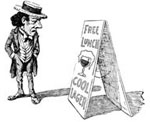
Economics for the Human Person
REDISCOVERING THE HUMAN FACE OF COMMERCE
“There is always a presupposed worldview and an understanding of the human person. Philosophy and economics are not therefore as popular opinion would suggest ‘uncommon bedfellows.'” — John McNerney, Wealth of Persons
“The reorientation of economics toward the ‘human subject’ need not end up in ‘methodological individualism’ but actually pushes us toward regaining an ‘anthropological and relational view’ of economic life. Economics can thus have a realism about it that is helpful to any philosophy based on what is.” — John McNerney, Wealth of Persons
The relation between man and this earth has been pondered by men in every age. The making and trading of goods has been with us throughout recorded history. The men who try to explain what we do, and must do, to transform what the planet has provided into useful goods are called economists. Economics is said to be about the allocation of scarce goods. The Greek origin of the word means house, or home, and, by extension, all the things needed to prosper in this home. Ultimately, its meaning expanded to include all the things needed, desired, or imagined by men for the fullness of their human lives. Aristotle held that what is uniquely human begins only when the economic problem is basically met. Yet, the material life of man is good and part of his very being, over which he bears peculiar responsibility.
Before he can do anything else, however, man must stay alive. Indeed, he needs to prosper somewhat before he can accomplish much else. The highest things for man begin with the more humble things of everyday life. Man is different from the animals, Aristotle also taught us. Nature did not endow him with instinct, claws, and hides. He has hands and reason, with which he is to provide for himself by virtue of his own genius and actions. Not everything is given to him from the beginning. If it were, it would be difficult for him to do much of anything for himself. Evidently, man was created with a task to accomplish. This is for his own good and that of others. If he wants something, he must figure out how to bring it about and make it available to others.
If we look at the history of economic thought, it becomes clear that something rather unusual is going on. Many political and social disasters have resulted from bad economics. Most “bad” economic theories have been postulated to redress a previously flawed economic theory or situation. John Maynard Keynes is famous, among other things, for having remarked that someone who thinks he has no economic presuppositions will discover, on investigation, that he is really following some obscure writer who lived several centuries before he did.
+++
Fr. John McNerney’s book Wealth of Persons: Economics with a Human Face (2016) bears a title clearly derived from what is considered the first “modern” economics text, Adam Smith’s The Wealth of Nations (1776). The key figure in McNerney’s book is not Adam Smith, though he is acknowledged. Rather, McNerney’s book follows the gradual development of the discipline of economics. He is clearly influenced, among the philosophers, by Bernard Lonergan, Karol Wojtyla, Eric Voegelin, and David Walsh. Their basic Thomistic orientation sought first to state clearly the arguments on all sides of some issue, then to account for what was good and what was lacking in the theory. With this fine book (along with Jennifer Roback Morse’s Love & Economics and John Mueller’s Redeeming Economics), we can come to a good understanding of economic history.
You May Also Enjoy
The Cyrenian approach to debt relief is personal: he lends a debtor money out of his own pocket at an unbeatable interest rate — nothing.
Why don’t the “underclass” want to leave it? Is there, perhaps, some failure not of psychology or school experience but of the moral imagination?
The considerable number of old 60s radicals who grew to guard their vast wealth were motivated by self-interest back in their hippie days too.

